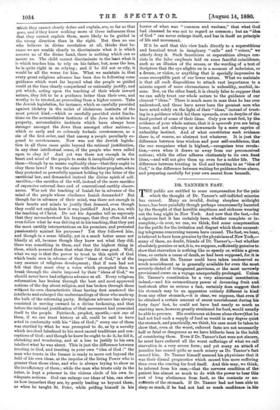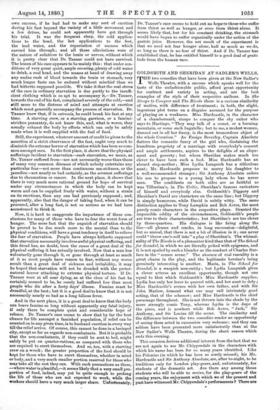DR. TANNER'S FAST.
THE public are entitled to some compensation for the pain which the thought of Dr. Tanner's self-inflicted miseries has caused. Many an invalid, during sleepless midnight hours, has been painfully though perhaps unnecessarily haunted by the thought of that horrible emptiness and sickness wearing out the long night in New York. And now that the fast,—for a rigorous fast it has certainly been, whether complete or in- complete,—is over, we can, we think, find some compensation for the public for the irritation and disgust which thotie nauseat- ing telegrams concerning nausea have caused. The fast, we hear, is believed to have been genuine by the physicians of New York,— many of them, no doubt, friends of Dr. Tanner's,—bat whether, absolutely genuine or not,it is, we suppose, sufficiently genuine to show that starvation is nothing like so speedy or, within a given time, so certain a cause of cleeth, as had been supposed, for it is impossible that Dr. Tanner could have taken unobserved se much nourishment as is generally available for even the most,. severely-dieted of beleaguered garrisons, or the most narrowly provisioned crews on a voyage unexpectedlyprolonged. Unless Dr. Tanner's constitution be a very abnormal constitution. indeed,—and his extraordinary power of devouring fruit and. beef-steak after so serious a fast, certainly does suggest that his stomach may be an apparatus entirely different in kind from any other stomach,—it is clear, we suppose, that even if he obtained a certain amount of secret nourishment during his forty days' fast, he could not have had nearly so much as starving men, however greatly straitened for food, would usually be able to procure. His continuous sickness alone shows:that he had not had such a supply of food as would in any degree quiet the stomach, and practically, we think, his case must be taken to show that, even at the worst, enforced fasts are not necessarily half so fatal or clangorous as we have hitherto been in the habit of considering them. Even if Dr. Tanner's fast were not sincere, he must have endured all the worst sufferings of what we call starvation in a very severe form; and yet many an attack of jaundice has caused quite as much misery as Dr. Tanner's fast caused him. Dr. Tanner himself assured his physicians that it was their dismal prognostics which caused him more suffering than even the craving for food itself. And this may, we think, be inferred from his case,—that the nervous condition of the patient has almost as much to do with the power to bear this sort of long abstinence from food, as the contents or no- contents of the stomach. If Dr. Tanner had not been able to sleep so much, if he had not had so muck confidence in his
own success, if he had had to make any sort of exertion during his fast beyond the variety of a little movement and a few drives, he could not apparently have got through his trial. It was the frequent sleep, the cold applica- tions to the head, the hot applications to the feet, the iced water, and the expectation of success which carried him through; and all these alleviations were of the nature of sedatives to the brain or nerves, without which it is pretty clear that Dr. Tanner could not have survived. The lesson of his case appears to be mainly this : that under con- ditions of very great quiet, ample covering, plenty- of cold water to drink, a cool head, and the means at hand of drawing away any undue rush of blood towards the brain or stomach, very much longer fasts can be endured without mischief than we had hitherto supposed possible. We take it that the real stress of the case in ordinary starvation is due partly to the insuffi- cient clothing which is so apt to accompany it,—Dr. Tanner, towards the end of his fast, complained severely of the cold,—and still more to the distress of mind and attempts at exertion which must generally accompany the process of starvation. Dr. Tanner knew that, if in extremis, he could break his fast at any time. A starving crew, or a starving garrison, or a famine- stricken peasantry, do not know this, and, what is worse, they usually exhaust the body by efforts which can only be safely made when it is well supplied with the fuel of food.
Still, the experiment, whatever amount of credit be given to the assertion of a strict observance of the fast, ought very much to diminish the extreme horror of starvation which has been so com- mon amongst men. In the first place, it shows that the physical sufferings incident to starvation—such starvation, we mean, as Dr. Tanner suffered from—are not necessarily worse than those of many very common diseases of which nobody entertains any particular fear—not more than continuous sea-sickness, or the jaundice—not nearly so bad certainly, as the severest sufferings due to rheumatism or cancer. In the next place, it shows that there is very much more rational ground for hope of survival under any circumstances in which the body can be kept warm and can be supplied freely with water, without a strain on its exertions, than any one had previously supposed ; and, apparently, also that the danger of taking food, when it can be procured, after a long fast, is not so serious as we had been accustomed to think it.
Now, it is hard to exaggerate the importance of these con- clusions for many of those who have to fear the worst form of hunger. The mere fact that the anguish of starvation should be proved to be due much more to the mental than to the physical conditions, will have a great tendency in itself to relieve the fear of starvation. People have always hitherto supposed that starvation necessarily involves awful physical suffering, and this dread has, no doubt, been the cause of a great deal of the physical suffering it has actually involved, Now that a man has voluntarily gone through it, or gone through at least as much of it as most people have reason to fear, without any worse result than a great deal of sickness and irritability, it may be hoped that starvation will not be dreaded with the preter- natural horror attaching to extreme physical torture. If Dr. Tanner were at all near dying, as at the close of his fast he certainly seemed to be, he Barely had suffered less than most people who die after a forty days' illness. Famine mast be dreadful, at the best; but it is a good deal to know that it is not necessarily nearly so bad as a long bilious fever.
And in the next place, it is a great deal to know that the body can brave famine so long without apparently any fatal injury, if only there be complete quiet and considerable hope of release. Dr. Tanner's case seems to show that by far the best chance for life amongst a famished population, if relief can be counted on in any given time, is to husband exertion in every way till the relief arrive. Of course, this cannot be done in a besieged city, except so far as regards non-combatants. But it is probable that the non-combatants, if they could be sent to bed, might safely be put on quarter-rations, as compared with those who are required to exert themselves. And so, too, with a starving crew on a wreck; the greater proportion of the food should be kept for those who have to exert themselves, whether in mind or body, and a very much smaller portion reserved for those who may take all the rest they can. With such precautions as these, —where water is plentiful,—it seems likely that a very small pro- portion of food, indeed, may yet be quite enough to prolong the his of those who are not expected to work, while the workers should have a very much larger share. Unfortunately, Dr. Tanner's case seems to hold out no hope to those who suffer from thirst as well as hunger, or even from thirst alone. It seems likely that, but for his constant drinking, the stomach world have begun to suffer organically under the action of the gastric juice. However, the net result of the experiment is that we need not fear hunger alone, half as much as we do, so long as there is no fear of thirst. And if Dr. Tanner has established that, he has entitled himself to a good deal of grati- tude from the human race.































 Previous page
Previous page